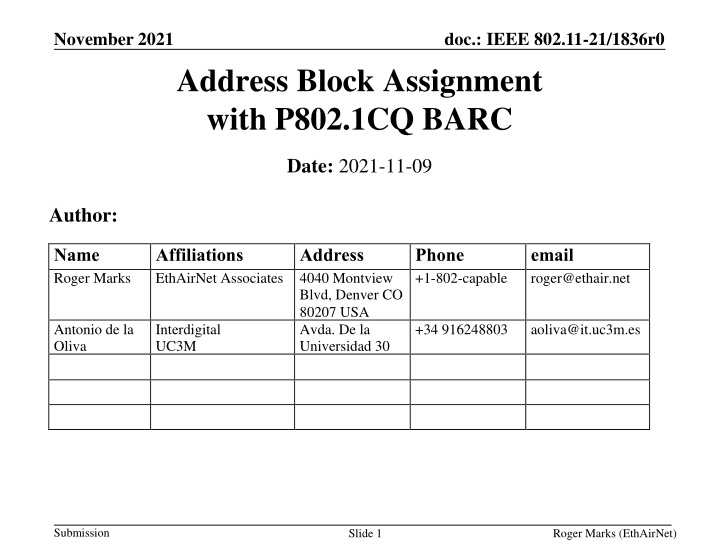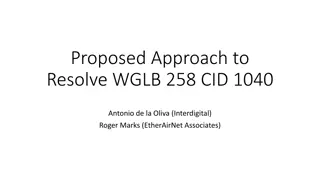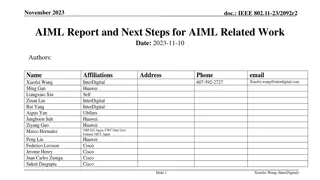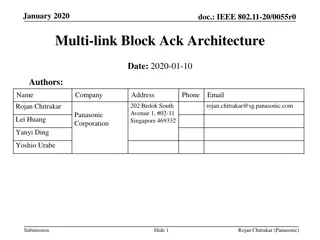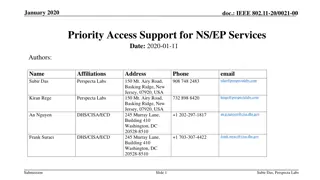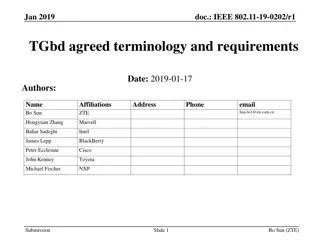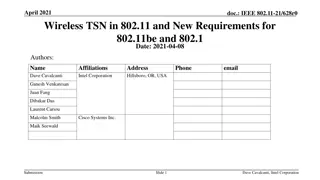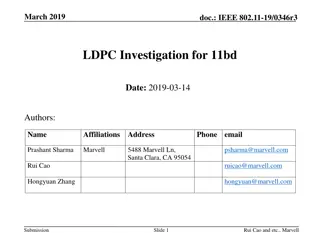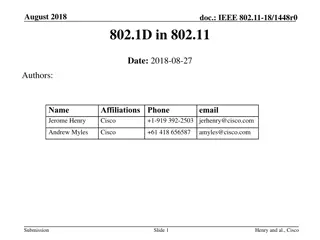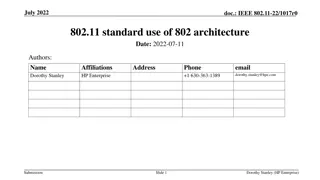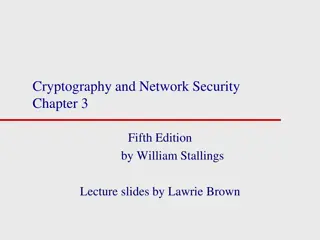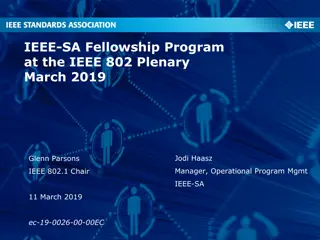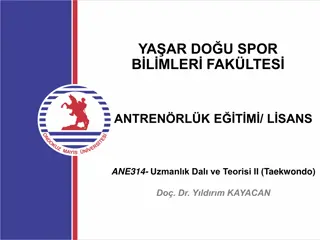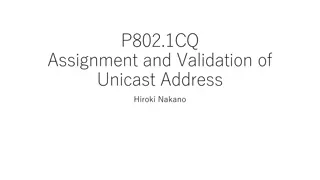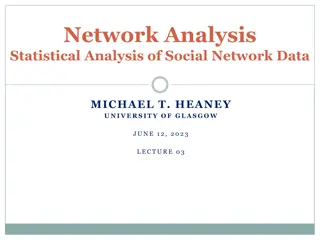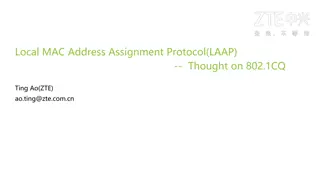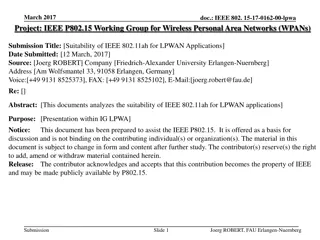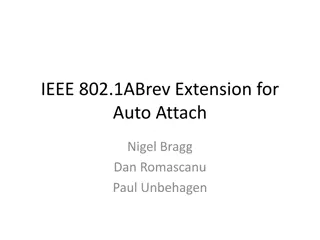IEEE 802.11-21 Address Block Assignment for Local Networks
This document discusses IEEE 802.11-21 standards for address block assignment in local networks. It covers protocols, procedures, and management objects for assigning 48-bit and 64-bit addresses, addressing multicast flows, and the Power of Dynamic Software-Defined Addressing. The BARC protocol, backward compatibility with MAAP, and the need for locally unique addresses are highlighted. Explore how IEEE is adapting to the increasing use of virtual machines and IoT devices in network addressing.
Download Presentation

Please find below an Image/Link to download the presentation.
The content on the website is provided AS IS for your information and personal use only. It may not be sold, licensed, or shared on other websites without obtaining consent from the author.If you encounter any issues during the download, it is possible that the publisher has removed the file from their server.
You are allowed to download the files provided on this website for personal or commercial use, subject to the condition that they are used lawfully. All files are the property of their respective owners.
The content on the website is provided AS IS for your information and personal use only. It may not be sold, licensed, or shared on other websites without obtaining consent from the author.
E N D
Presentation Transcript
November 2021 doc.: IEEE 802.11-21/1836r0 Address Block Assignment with P802.1CQ BARC Date: 2021-11-09 Author: Name Roger Marks Affiliations EthAirNet Associates 4040 Montview Address Phone +1-802-capable email roger@ethair.net Blvd, Denver CO 80207 USA Avda. De la Universidad 30 Antonio de la Oliva Interdigital UC3M +34 916248803 aoliva@it.uc3m.es Submission Slide 1 Roger Marks (EthAirNet)
P802.1CQ Status [1] IEEE SAProjectAuthorization (PAR) P802.1CQ - Initiated: 2016-02-05; Extended 2020-06-03; Expires: 2022-12-31 Draft Standard for Local and Metropolitan Area Networks: Multicast and Local Address Assignment In 802.1 Working Group, Time-Sensitive Networking (TSN) Task Group - https://1.ieee802.org/tsn/802-1cq/ Current draft: P802.1CQ/D0.7 - reviewed in Task Group Ballot - comment resolution completed in September Awaiting editor s implementation of new draft 2
P802.1CQ PAR Details Scope: This standard specifies protocols, procedures, and management objects for locally-unique assignment of 48-bit and 64-bit addresses in IEEE 802 networks. Peer-to-peer address claiming and address server capabilities are specified. Need: Currently, global addresses are assigned to most IEEE 802 end station and bridge ports. Increasing use of virtual machines and Internet of Things (IoT) devices could exhaust the global address space. To provide a usable alternative to global addresses for such devices, this project will define a set of protocols that will allow ports to automatically obtain a locally-unique address in a range from a portion of the local address space. Multicast flows also need addresses to identify the flows. They will benefit from a set of protocols to distribute multicast addresses. Peer-to-peer address claiming and address server capabilities will be included to serve the needs of smaller (e.g., home) and larger (e.g., industrial plants and building control) networks. 3
Multicast Address Assignment In P802.1CQ, multicast addresses are assigned to end stations. - In other scenarios, multicast addresses are assigned to protocols. In some TSN networks, streams are addressed to multicast addresses assigned by the sender (the talker ). A peer-to-peer protocol (MAAP) for a talker to claim a multicast address range is specified in IEEE Std 1722 ("Transport Protocol for Time-Sensitive Applications in Bridged LANs"). P802.1CQ provides backward compatibility with MAAP. - new functionality: - address blocks - Registrars (address servers) - operation without a global address 4
Power of Dynamic Software-Defined Addressing Half of IEEE 802 addresses are global - unique among all devices over an intended span of 100 years - generally burned-in by the factory, so flat Half of IEEE 802 addresses are local - assignable dynamically - vast quantity available, since uniqueness restriction limited to the LAN - can be liberally assigned - can be thoughtfully assigned to have addressing power "BlockAddress Registration and Claiming (BARC) protocol 5
BARC assigns MAC Addresses in Blocks AnAddress Block (AB) is a set of local BARC addresses. AnAB includes equal-sized and unicast and multicast contiguous sub-blocks. No BARC address falls within more than oneAB. RegistrableAddress Block Identifier (RABI) - identifies RegistrableAddress Block (RAB) with RegistrableAddresses (RAs) - RABIs are held in inventory of a Registrar - may be assigned to Claimants ClaimableABAddress (CABA) - identifies ClaimableAddress Blocks (CABs) with ClaimableAddresses (CAs) - claimable by a Claimant without using a Registrar - CABAis a multicast MAC address, not in anyAB, and used as a DA AnAddress Block Designation (ABD) is a CABAor a RABI. Alarge set of Temporary UnicastAddresses (TUAs) is specified - useful for initial discovery by Claimant lacking a unicast address 6
Registrar Claimant need not be aware of Registrar when initiating a claim. Registrar maintains an inventory of RABIs. a protocol specifies how Registrars acquire RABIs. set of RABs is disjoint from the set of CABs AB is either claimable (CAB) or registrable (RAB); not both Registrar listens for all messages to a CABA. Registrar can respond to a DISCOVER with an offer of a RABI in its inventory. The offer can also defend the DISCOVER s CABA. Registrar confirms registration of request for offered RABI. Pre-claim Inquiry lets Claimant reach Registrar or Advisor. Client can learn of Registrars and received Claim proposals. 10
BARC over WLAN BARC Claimant exchanges messages on the LAN for address block assignment association is bound to one address inefficient to associate, run BARC, and rebuild association address block could be assigned with 802.11 pre-association communication Current lines of thought are: Modify Local MAC Address Policy ANQP-element to include an address block assignment Develop within IEEE 802.1CQ a new protocol payload to be included in the Service Information Request/Response ANQP-elements Assigned multicast addresses could be used for stream Das How to use multiple unicast addresses assigned to STA? Multiple associations? Single association enabled to carry all assigned addresses? 14
BARC Applications General address assignment o eliminates need for global addresses reducing consumption may simplify manufacturing o maintains uniqueness within the LAN o backward-compatible with IEEE 802 addressing and bridging o could be useful to address privacy concerns in global addressing o provides contiguous unicast and multicast blocks (identical but 1 bit) Apply address blocks to structure semantic addresses o addressing to reflect topology and hierarchy o simplified forwarding o add flow identification to address o useful in forwarding and for other purposes o e.g., to multiplex within a single end station o alternative to completely random assignment; e.g., in WLAN o dynamic assignment provides MAC address privacy o protocol protects against duplication o address blocks can code frames for location, flow, stream, etc. o bridging of 64-bit addressing in a 48-bit bridged LAN 15
References [1] IEEE Standards Project P802.1CQ, Multicast and local address assignment. https://1.ieee802.org/tsn/802-1cq [2] IEEE Standards Association, IEEE Standard for Local and Metropolitan Area Networks: Overview andArchitecture Amendment 2: Local MediumAccess Control (MAC) Address Usage, IEEE Std 802c-2017 https://ieeexplore.ieee.org/document/8016709 16
